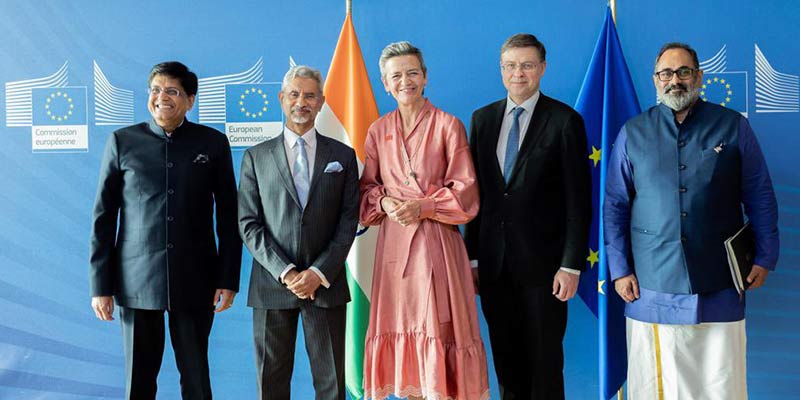- India
- May 17
Explainer - India-EU Trade and Technology Council (TTC)
• The first ministerial meeting of the India-EU Trade and Technology Council (TTC) was held in Brussels on May 16 during which the two sides discussed enhanced cooperation in digital and clean technology that will help them achieve their shared vision of a sustainable future.
• The meeting was co-chaired by Minister of External Affairs S. Jaishankar, Commerce and Industry Minister Piyush Goyal and Communications, Electronics and IT Minister Rajeev Chandrasekhar, with European Commission executive vice-presidents Margrethe Vestager and Valdis Dombrovskis.
• India and the European Union underlined the importance of advancing across all Working Groups established under the TTC.
• The next ministerial meeting is planned for early 2024 in India to take stock of the progress achieved and decide on further actions.
India-EU Trade and Technology Council (TTC)
• The India-EU Trade and Technology Council (TTC) was launched by Prime Minister Narendra Modi and President of the European Commission Ursula von der Leyen during the latter’s visit to India in April 2022.
It led to the creation of three Working Groups:
i) Working Group on Strategic Technologies, Digital Governance and Digital Connectivity
ii) Working Group on Green and Clean Energy Technologies
iii) Working Group on Trade, Investment and Resilient Value Chains.
• The India-EU Trade and Technology Council is the second such bilateral forum for the EU and the first one established with any partner for India. The EU and the US launched a TTC in June 2021.
• The TTC is a key forum to deepen the strategic partnership on trade and technology between the two partners.
• The TTC will help increase India-EU bilateral trade, which is at historical highs, with €120 billion worth of goods traded in 2022. In 2022, €17 billion of digital products and services were traded.
Scope of TTC
• Rapid changes in the world’s geopolitical environment highlight the need for an even deeper strategic partnership between India and the European Union. As vibrant democracies, open market economies and pluralistic societies India and the European Union share fundamental values and have a common interest in ensuring security, prosperity and sustainable development in a multi-polar world. Both partners also face a challenging and volatile global political, economic and security landscape.
• The TTC was set up as a key coordination platform to address key trade, trusted technology and security challenges, to promote a human-centric approach to the digital transformation, and to deepen their bilateral relationship in these fields.
• The TTC will allow both partners to tackle challenges at the nexus of trade, trusted technology and security, and thus deepen cooperation in these fields.
• The choice of this format reflects the strategic nature both sides attach to their bilateral relationship, the desire to guide their cooperation towards tangible results and the geo-political significance of their trade and technology links in the context of a more contested and rapidly evolving international environment.
• They reaffirm that international rules-based approaches to trade, technology, and innovation that are founded on solid democratic principles and values can improve the lives of their citizens and generate greater prosperity for people around the world.
• Cooperation within the TTC will also feed into coordination in multilateral bodies and wider efforts with like-minded partners, with the aim of promoting a democratic model of digital governance.
• It will provide the political steer and the necessary structure to operationalise political decisions, coordinate technical work, and report to the political level to ensure implementation and follow-up in areas that are important for the sustainable progress of European and Indian economies.
• Ministerial meetings of the TTC will take place at least once a year, with the venue alternating between the EU and India.
Manorama Yearbook app is now available on Google Play Store and iOS App Store


